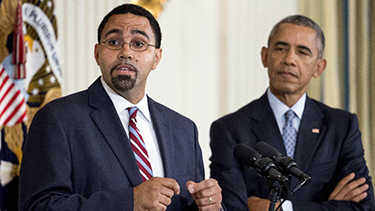New Acting Secretary of Education, John B. King, Announces Plan to Promote Racial and Economic Integration in U.S. Public Schools
Posted On February 18, 2016
In an important development for federal U.S. education policy, newly appointed Acting Secretary of Education, John B. King, recently announced the U.S. Department of Education will seek to develop and implement policies that will promote voluntary economic and racial integration in U.S. schools, which continue to be adversely affected by enduring rates of concentrated poverty and racial segregation. This effort arguably represents the most significant policy of its kind in decades on a federal level in terms of its direct engagement with both racial segregation and economic inequality as, according to analysisconducted by the prestigious Civil Right Project at UCLA, federal educational policies since the 1980s have failed to address the continuing harms of racial segregation in U.S. schools and their direct link to economic inequality.
King’s announcement that the Department of Education would focus on the development of socio-economic and integration policies occurs at a critical time in the history of U.S. public schools, which leading scholars have identified as “Resegregating” for nearly the last 30 years to levels of racial segregation not seen since the 1970s. Moreover, as noted, this resegregation can be directly linked to economic inequality wherein, on average, black and Latino students attend schools with nearly twice as many low-income students as the average white or Asian students.
Further compounding the adverse effects of these racial and economic dynamics is the fact that as of September 2014, white students no longer comprised the majority of students in public schools in the U.S. for the first time in history. Yet, even with this unprecedented racial demographic change approximately 80 percent of Latino students and 74 percent of black students attend majority non-white schools, while on average white students attend schools that are approximately 75 percent white. In fact, according to studies conducted by the Civil Rights Project, schools in the Southern and Western U.S. are now majority non-white, with whites comprising the second largest student populations in the West and Latinos the majority student population in the South.
Acting Secretary King’s announcement drew strong support from civil rights groups, attorneys, educators, including the prestigious National Coalition on School Diversity, of which Chancellor Ivery and WCCCD’s Institute for Social Progress are members. Secretary King was recently quoted in the American Prospectas saying: “Research shows that one of the best things we can do for all children – black or white, rich or poor – is give them a chance to attend strong, socioeconomically diverse schools,” which is a view that is strongly supported in increasing academic scholarship dealing with the developing field of studies concerned with what is now termed “the science on diversity”.


